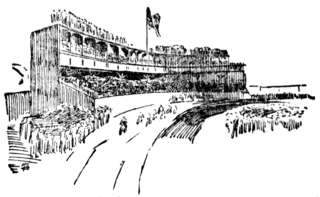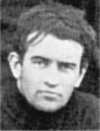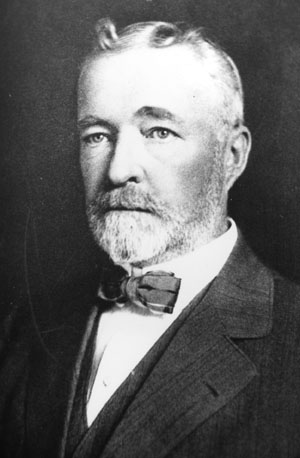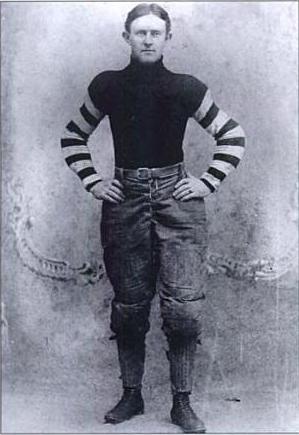Related Research Articles

Recreation Park was a sporting grounds and stadium that stood from 1865 to 1905 in Allegheny City, Pennsylvania, which was annexed in 1907 and became the North Side region of Pittsburgh. The park was bounded by Allegheny Avenue, Pennsylvania Avenue, Grant Avenue, and Boquet Street.
George Oliver Barclay was an American football and baseball player. He played Major League Baseball for the St. Louis Cardinals and later the Boston Beaneaters. He was also an early professional football player-coach for the Greensburg Athletic Association. He was nicknamed "The Rose" for his concern with his looks and "Deerfoot" because of his speed. Barclay also invented the first football helmet.

Arthur Poe was an American football player and businessman, and one of six celebrated Poe brothers—second cousins, twice removed, of American author Edgar Allan Poe—to play football at Princeton in the late 19th and early 20th century. He was selected retroactively by the Helms Athletic Foundation as the national college football player of the year for 1899, and was elected to the College Football Hall of Fame in 1969.
The Latrobe Athletic Association was a professional football team located in Latrobe, Pennsylvania, from 1895 until 1909. A member of the unofficial Western Pennsylvania Professional Football Circuit, the team is best known for being the first football club to play a full season while composed entirely of professional players. In 1895, team's quarterback, John Brallier, also became the first football player to openly turn professional, by accepting $10 and expenses to play for Latrobe against the Jeannette Athletic Club.
The Greensburg Athletic Association was an early organized football team, based in Greensburg, Pennsylvania, that played in the unofficial Western Pennsylvania Professional Football Circuit from 1890 until 1900. At times referred to as the Greensburg Athletic Club, the team began as an amateur football club in 1890 and was composed primarily of locals before several professional players were added for the 1895 season. In 1894 it was discovered that the team had secretly paid formerly Indiana Normal player, Lawson Fiscus, to play football and retained his services on salary. The team was the chief rival of another early professional football team, the Latrobe Athletic Association.
The PittsburghStars were a professional American football team based in Pittsburgh, Pennsylvania in 1902. The team was a member of the first National Football League, which has no connection with the modern National Football League. The league was a curious mixture of baseball and football, with two of the three teams sponsored by the major league baseball teams of the same names, and the Pittsburgh team suspected of being secretly financed by baseball's Pittsburgh Pirates. The Stars were managed by Dave Berry, previously the manager of the Latrobe Athletic Association professional football team.
The Philadelphia Athletics was a professional American football team based in Philadelphia in 1902. The team was a member of what was referred to as the National Football League. This league has no connection to the National Football League of today. The whole "league" was a curious mixture of baseball and football. During the league's only year in existence, two of the three teams that were financed by the owners of the Philadelphia Athletics and the Philadelphia Phillies, hence the names Philadelphia Athletics and Philadelphia Phillies. The Pittsburgh Stars made up the third team and was suspected of being financed by the Pittsburgh Pirates baseball team.
The first National Football League (NFL) was the first attempt at forming a national professional American football league in 1902. This league has no ties with the modern National Football League. In fact the league was only composed of teams from Pennsylvania, which meant it was actually regional, despite having locations in the two largest cities in Pennsylvania. Two of the teams were based in Philadelphia, while the third was based in Pittsburgh. This NFL was a curious mixture of football players and baseball players who adapted to playing football. Future Baseball Hall of Famer Rube Waddell was with the Philadelphia Athletics, and pitcher Christy Mathewson a fullback for Pittsburgh. Two of the three teams were owned by the Philadelphia Phillies and Philadelphia Athletics, with the third team suspected of being owned by the Pittsburgh Pirates. The league folded after the 1902 season.
The Philadelphia Phillies were a professional American football team based in Philadelphia, Pennsylvania in 1902. The team was a member of what was referred to as the National Football League—not to be confused with the National Football League of today. The whole league was a curious mixture of football players as well as baseball players who adapted to playing football. The Phillies were owned and financed by baseball's Philadelphia Phillies just as the owners of the Philadelphia Athletics financed their team, the Philadelphia Athletics. The Pittsburgh Stars made up the third team and was suspected of being financed by the Pittsburgh Pirates baseball team.
The Duquesne Country and Athletic Club was a professional football team based in Pittsburgh, Pennsylvania from 1895 until 1900. The team was considered one of the best, if not the best, professional football teams in the country from 1898 until 1900. However, the team is most famous for being the first football franchise to be owned by an individual, William Chase Temple.

Charles Edgar "Blondy" Wallace was an early professional football player and later convicted criminal during the Prohibition Era. He was a 240-pound, former Walter Camp second-team All-American tackle from the University of Pennsylvania. He also played two years at Peddie Institute, in New Jersey, winning state championships in 1896 and 1897. During his professional playing career he was involved in almost every major event in professional football between 1902 and 1907. Over that timespan he played for the independent Philadelphia Athletic Club, the Philadelphia Athletics of the first National Football League, the "New York" team and the Syracuse Athletic Club in the 1902 World Series of Football, the Franklin Athletic Club and the Canton Bulldogs of the Ohio League. In 2022, he was named one of the 10 inaugural members for the Football Learning Academy's Hall of Honor, which looks to acknowledge deserving icons that are not currently inducted in the Pro Football Hall of Fame.

Frederick Joseph Crolius was an American football and baseball player and coach. He was the first player from Tufts University to play Major League Baseball. He was at Tufts in 1894, and at Dartmouth College, where he also played college football, from 1896 until 1899. He spent two years in majors with the Boston Beaneaters and the Pittsburgh Pirates. Crolius also played pro football with the independent Homestead Library & Athletic Club and the Pittsburgh Stars of the first National Football League. He later served as a coach of both sports after his playing career ended.

The 1901 Homestead Library & Athletic Club football team won the professional football championship of 1901. The team was affiliated with the Homestead Library & Athletic Club in Homestead, Pennsylvania, near Pittsburgh. The team featured a lineup of former college All-Americans paid by Pittsburgh Pirates' minority-owner William Chase Temple.
The 1900 Homestead Library & Athletic Club football team won the professional football championship of 1900. The team was affiliated with the Homestead Library & Athletic Club in Homestead, Pennsylvania, near Pittsburgh. The team featured a lineup of former college All-Americans paid by Pittsburgh Pirates' minority-owner William Chase Temple.

William Chase Temple was a coal, citrus, and lumber baron during the late 19th and early 20th centuries. He was also a part owner of the Pittsburgh Pirates in Pittsburgh, Pennsylvania from baseball's National League of Professional Baseball Clubs, established 1876. He also established the Temple Cup, a silver trophy awarded to the winner of a best-of-seven, post-season Major League Baseball championship series that was conducted for four seasons in the National League, from 1894 to 1897. He became the first sole owner of a professional American football team, in 1898.
Charles Robert Shiring was a professional football player from Pittsburgh, Pennsylvania. He began his playing career with the Pittsburgh Athletic Club during the late 1890s and the Homestead Library & Athletic Club in 1901. In 1902, he played for the Pittsburgh Stars of the first National Football League (NFL) who ended up winning the league title. Since the Stars consisted of the best professional players from western Pennsylvania at the time, it can be said that Shiring was considered the best at his position, center, in the region. However Shring is best known for playing for the Massillon Tigers from 1903 until 1907. He finally served from 1907 to 1909 as a player-coach for the Pittsburgh Lyceum, Pittsburgh's last championship professional football team, until the 1970s.

David J. Berry was an American football manager during the late 19th and early 20th centuries. He was the top promoter for the sport during that time period. He is credited with inventing the "all-star game concept" in 1898, and also helped to form one of the first organized football leagues in 1902.
Artie “Hart” Miller was an early professional American football player for the Homestead Library & Athletic Club in 1900 and 1901, as well as the Pittsburgh Stars of the first National Football League. He played the position of halfback. Before the start of the 1902 season, Miller was working as a lumberjack in Wisconsin.

John Ashley "Daff" Gammons was an American baseball and football player, college football and baseball coach, amateur golfer, and insurance agent. He played professional baseball for one season, 1901, for the Boston Beaneaters. Gammons served as the head football coach at Brown University in 1902, 1908, and 1909, and as its head baseball coach from 1901 to 1903.
Herman Charles Kerkhoff was a professional American football player from the mid 1890s until 1906.
References
- Carroll, Bob (1980). "Dave Berry and the Philadelphia Story" (PDF). Coffin Corner. Professional Football Researchers Association. 2 (Annual): 1–9.
- Peterson, Robert W. (1997). Pigskin: The Early Years of Pro Football. Oxford University Press. ISBN 0-19-511913-4.
- "Baseballists in Football". New Haven Evening Register. 1900-10-20.
- "No More Wednesday Games: Mid-West Football Given up by Practically All the Colleges". New Haven Evening Register. 1900-10-30.
- PFRA Research. "And Yet Again" (PDF). Professional Football Researchers Association. p. 1.